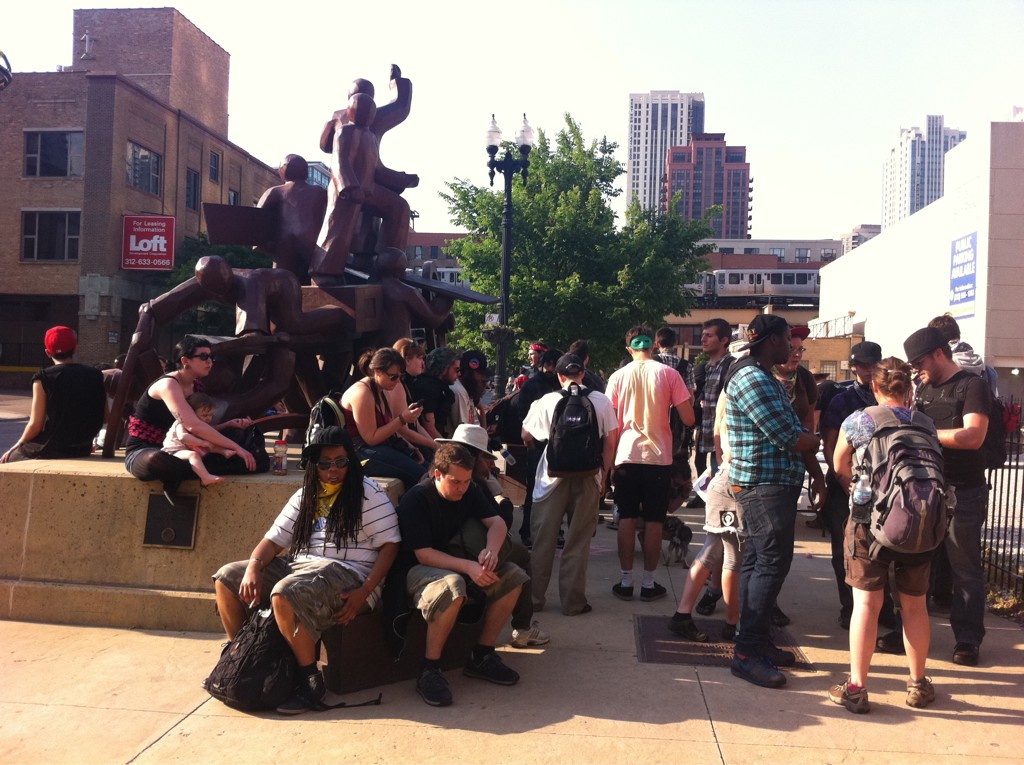One of the Plus Brigades tactics taught to people at OWS Spring Training was “civilians.” It means breaking up the mass of demonstrators and disappearing into the New York city foot traffic, only to recongregate later at an arranged spot. It’s a good way to get onto Wall Street for example. In light of the on-going militarization of North American cities and the right to assembly, it begins to take on other meanings. It can be resistant simply to claim civilian status, to act like a civilian, to demand that law enforcement treat this as peacetime.
I had been wondering if Occupy’s tactic as a whole might be “civilians,” a returning into the social fabric with challenges to its normalizing operations punctuated by resurgences on selected days–the next “day” is targeted in New York as September 17, the one year anniversary.
What has happened in Chicago and Montréal makes it clear that “civilians” is every bit as much about resisting the militarization of everyday life. In Chicago three activists have been arrested for alleged terrorism offenses: based on the presence of a home-brew kit. Supposedly the bottles indicated preparations for Molotov cocktails. As might my recycling. Now those arrested are subject to the full panoply of anti-terrorism legislation. As the day has gone on, the police have dramatically amplified their charges, while defense lawyers are suggesting yet another operation co-ordinated by police informants.
In Montréal the hasty legislation passed through Québec’s parliament yesterday was a veritable State of Emergency. Known as Bill 78, it’s extraordinary. In addition to ending the academic year forthwith and requiring students to return early next semester (what happens to those trying to graduate I wonder?), the law then criminalizes protest in a new way:
any gathering of 50 or more people must submit their plans to the police eight hours ahead of time and must agree to any changes to the gathering’s trajectory, start time, etc. Any failure to comply will be met with a fine of up to $5,000 for every participant, $35,000 for someone representing a ‘leadership’ position, or $125,000 if a union – labour or student – is deemed to be in charge. The participation of any university staff (either support staff or professors) in any student demonstration (even one that follows the police’s trajectory and instructions) is equally punishable by these fines.
So my entire class last semester would have had me liable for draconian fines, given that we attended OWS actions (by consensus and in ways determined by group members). They’re not finished though. You can’t cover your face with a mask, scarf or hood–in Canada, with its mild winter climate.
Passages like this make it truly State of Exception legislation, a new low for North American civil liberties post-Cold War:
Anyone who, by act or omission, helps or, by encouragement, advice, consent, authorization or command, induces a person to commit an offence under this act is guilty
You could be accused of giving advice for teaching radical texts, be accused of omission for not reporting an activist student to the police–this is truly unpleasant catch-all legislation.
The overreaction stems from the anxiety that anti-austerity is on the move. Counterinsurgency doctrine holds that the first element of defeating insurgency is to quarantine it and then cut it out for fear of contagion. So it’s not the hundreds of activists in Chicago, or even the thousands in Montréal, that are causing the panic–it’s the idea that this might go viral from Athens to Paris, Chicago, Montréal, Frankfurt–and then where next? This is Contagion: The Reality Show only it’s not funny.
So civilians, yes: people with civil rights, who should be presumed to be acting as civilians not insurgents, who have the right to assembly, free speech and self-presentation. These are very fundamental propositions and for those of you who have been standing back from the movement for any of the usual reasons, now is the time to get back involved. Like it or not, this involves you now.
In New York, there’s a meeting in solidarity with Montréal on Sunday at 3pm in Union Square by the Gandhi statue. Hope to see you there.



I suppose that’s why they call the strategy of Freedom Summer in 1963 Mississippi civil disobedience. Disobedience is by definition resistance. Compliance with rules about marching, asking permission to assemble, staying within the barriers–these are not acts of resistance.
James Forman’s book The Making of Black Revolutionaries remains instructive.
http://www.washington.edu/uwpress/search/books/FORMAK.html